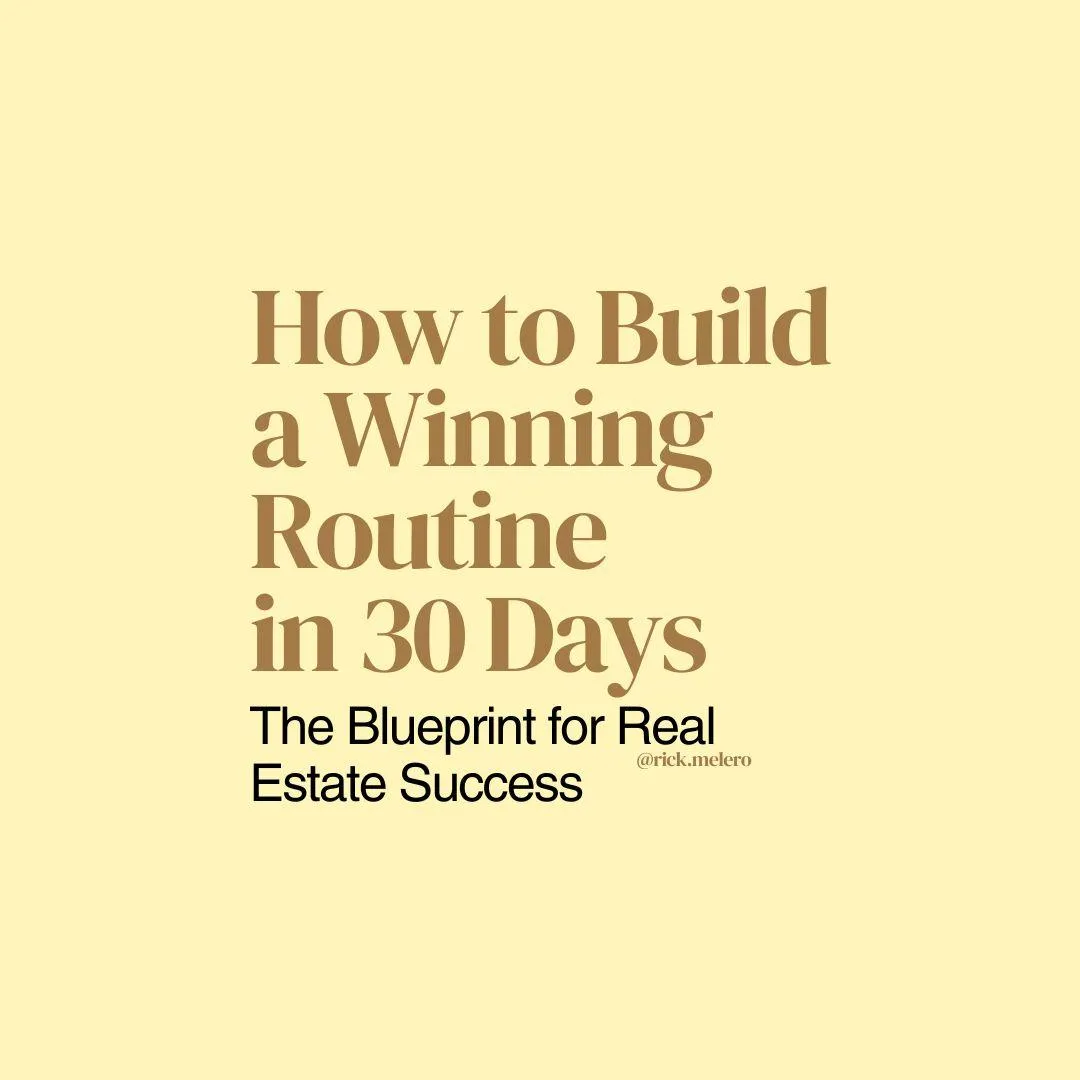
Blog Posts

How to Build a Winning Routine in 30 Days: The Blueprint for Real Estate Success
How to Build a Winning Routine in 30 Days: The Blueprint for Real Estate Success
Success in real estate isn’t built overnight—it’s created through consistent, daily action. But for many beginners, knowing where to start and how to structure their time feels overwhelming.
Here’s the truth: the difference between those who succeed and those who don’t often boils down to one thing—a winning routine. In this post, we’ll outline a 30-day action plan to help you establish habits that will lay the foundation for long-term success in real estate.
Week 1: Laying the Groundwork
Day 1-7: Education and Goal Setting
Start by equipping yourself with knowledge and setting clear, measurable goals. This week is all about understanding the basics and preparing for action.
Daily Actions:
Learn the Fundamentals
Dedicate 30–60 minutes a day to reading real estate books or watching educational videos.
Recommended resources: Investing With A Purpose, Rich Dad Poor Dad, The Millionaire Real Estate Investor, and BiggerPockets podcasts.
Define Your Goals
Write down what you want to achieve in real estate (e.g., close one deal in six months, build a $500/month cash flow in a year).
Use the SMART framework (Specific, Measurable, Achievable, Relevant, Time-bound).
Identify Your Strategy
Decide on your focus: wholesaling, flipping, buy-and-hold, or house hacking.
Research your chosen strategy thoroughly.
Choose Your Market
Study neighborhoods in your area to understand property values, rental demand, and growth trends.
Week 2: Building a Foundation for Action
Day 8-14: Networking and Market Research
With your goals and strategy in place, it’s time to start building connections and deepening your market knowledge.
Daily Actions:
Connect with Key Players
Reach out to local real estate agents, investors, and contractors.
Attend one networking event or join an online community
Focus on building genuine relationships—offer value before asking for help.
Analyze Your Market
Spend at least 30 minutes a day reviewing properties in your chosen area.
Look for trends like rising property values, new construction, or rental demand.
Drive for Dollars
Spend a couple of hours driving through neighborhoods to spot distressed properties.
Write down addresses and research the owners later.
Weekly Goal:
Build a list of 20–30 potential properties and start identifying opportunities for deals.
Week 3: Taking Action
Day 15-21: Lead Generation and Deal Analysis
This week, it’s all about action. Start generating leads and analyzing deals to move closer to your first offer.
How to Find Your First Real Estate Deal: A Beginner’s Step-by-Step Playbook
Daily Actions:
Generate Leads
Call or mail property owners from your “driving for dollars” list.
Use platforms like Craigslist and Facebook Marketplace to find motivated sellers.
Spend at least 1 hour a day prospecting for leads.
Analyze Deals
Practice running the numbers on at least 5 properties daily.
Focus on calculating ARV (After Repair Value) and repair costs.
Prepare to Make Offers
Research how to write simple contracts and calculate offer prices using the 70% rule:
Offer Price = (ARV x 70%) - Repairs
Weekly Goal:
Analyze 25–35 deals and identify at least 3 properties to make offers on.
Week 4: Building Momentum
Day 22-30: Making Offers and Learning from Experience
By now, you’ve built a strong foundation—now it’s time to take bold steps. This week is about making offers and learning from the process.
Daily Actions:
Make Offers
Set a goal to make at least 1–2 offers every day.
Be prepared for rejection—it’s part of the process.
Follow Up
Keep track of your offers and follow up with sellers weekly.
Deals often come through persistence, not the first conversation.
Reflect and Adjust
At the end of each day, review what worked and what didn’t.
Write down lessons learned to improve your approach.
Weekly Goal:
Submit at least 10 offers and build a pipeline of potential deals.
Ongoing Success Tips
Stay Consistent
Your routine doesn’t end after 30 days. Keep refining and sticking to these habits as you grow.Focus on Progress, Not Perfection
You don’t need to have everything figured out to start. Each step forward is a step closer to your goals.Celebrate Small Wins
Whether it’s analyzing your 50th deal or getting your first offer accepted, take time to acknowledge your progress.
The 5 Biggest Mistakes New Real Estate Investors Make—And How to Avoid Them
Conclusion
Building a winning routine is the foundation of real estate success. Over the next 30 days, focus on education, networking, lead generation, and consistent action. By the end of this plan, you’ll not only have momentum—you’ll be ready to close your first deal and take the next step in your real estate journey.
